Preparing for the Karnataka Management Aptitude Test (KMAT) requires strategic planning, dedicated effort, and a comprehensive understanding of the exam structure. KMAT is a significant examination for individuals aspiring to pursue management studies in Karnataka. This comprehensive guide on KMAT preparation tips aims to equip you with invaluable insights and effective strategies to maximize your performance in this competitive test.

MAT 2024 Overview
The Karnataka Management Aptitude Test (KMAT) is a standardized entrance examination conducted for aspiring management students seeking admissions in various postgraduate programs offered by management institutions across Karnataka. KMAT assesses candidates’ aptitude in three major areas: Language Comprehension, Mathematical Skills, and Logical Reasoning. This exam, recognized by prominent institutes, holds significant value in the admission process. KMAT’s objective is to evaluate an individual’s analytical, logical, and problem-solving skills, thus ensuring a fair selection process for aspirants aspiring to pursue their management studies in Karnataka.
Creating a Personalized Study Plan:
Self-Assessment:
Begin by assessing your strengths and weaknesses in various KMAT sections such as Language Comprehension, Mathematical Skills, and Logical Reasoning.
Set Clear Goals:
Define achievable short-term and long-term goals for your KMAT preparation, considering your target score and the time available before the exam.
Understand the Exam Pattern:
Familiarize yourself with the KMAT exam structure, including the number of sections, types of questions, and allotted time for each section.
Break down the Syllabus:
Divide the KMAT syllabus into smaller, manageable segments and allocate study time to each, ensuring comprehensive coverage.
Prioritize Sections:
Identify the sections you find challenging and allocate more study time to improve your skills in those areas.
Allocate Study Hours:
Determine the number of study hours you can dedicate each day, considering your daily routine and responsibilities.
Create a Weekly Schedule:
Develop a weekly study plan that outlines which topics to cover each day, incorporating regular revision and practice sessions.
Incorporate Regular Practice:
Integrate practice tests and quizzes into your study plan to evaluate your progress and adapt your approach accordingly.
Flexibility in Planning:
Allow flexibility in your study plan to accommodate unexpected events, additional practice, or revisiting challenging topics.
Revise Regularly:
Allocate specific time for periodic revisions to reinforce concepts and improve retention of learned material.
Section-wise Preparation Strategies:
Language Comprehension:
Enhance Vocabulary: Regularly read newspapers, articles, and books to improve your vocabulary, which is crucial for this section.
Practice Reading Comprehension: Engage in reading comprehension exercises to improve your reading speed and comprehension skills.
Focus on Grammar and Verbal Reasoning: Brush up on grammar rules and practice exercises on sentence correction and verbal reasoning.
Mathematical Skills:
Review Fundamental Concepts: Revisit basic mathematical concepts like arithmetic, algebra, geometry, and number systems.
Practice Regularly: Solve a variety of mathematical problems daily to strengthen your problem-solving abilities and increase speed.
Learn Shortcut Techniques: Master shortcuts and tricks to solve mathematical problems quickly and accurately.
Logical Reasoning:
Understand Different Types of Questions: Familiarize yourself with various logical reasoning question types, such as puzzles, seating arrangements, and data sufficiency.
Practice Regularly: Solve a wide range of logical reasoning problems to improve your analytical and critical thinking skills.
Develop Logical Flow: Work on understanding the logic and creating a structured approach to solve different problems.
Data Analysis and Sufficiency:
Interpret Different Data Formats: Practice interpreting data from charts, graphs, and tables to become adept at data analysis.
Strengthen Data Sufficiency Skills: Practice determining whether the given data is sufficient to answer a question, a key aspect of this section.
Indian & Global Environment:
Stay Updated: Regularly follow news, current affairs, and business updates to stay informed about the latest developments.
Focus on Business and Economics: Understand key economic concepts, business terminology, and corporate events.
Exam Day Tips
- Spend no time reading over the entire test. begin attempting the paper as soon as the test begins.
- In your first attempt, start with the simple questions and finish the first four sections’ achievable questions in 60-70 minutes.
- In your second and third tries, try to answer as many questions as you can in another 60 to 70 minutes while maintaining 100% correctness.
- Try the questions that you find a bit challenging but manageable in the 20 to 30 minutes that are left. If there is still time, attempt to answer more questions, but don’t linger on any in particular. Delete the questions that take up the most time and are challenging for you.

Time Management Division
| Time Management Strategies for MAT Preparation |
|---|
| 1. Understand Exam Format |
| Familiarize yourself with exam structure and section-wise time allocation. |
| 2. Practice and Mock Tests |
| Regularly practice previous year’s papers and take timed mock tests. |
| Simulate the exam environment to gauge time needed for each section. |
| 3. Efficient Problem-Solving |
| Adopt effective techniques for quicker problem-solving. |
| Prioritize questions based on difficulty level to maximize scoring. |
| 4. Structured Study Schedule |
| Develop a study plan allocating specific time slots for each section. |
| Follow the schedule to cover all topics within the planned timeframe. |
| 5. Incorporate Breaks |
| Include short breaks to refresh your mind and maintain focus. |
| Avoid burnout by balancing study sessions with brief relaxation periods. |
| 6. Performance Analysis |
| After practice tests, analyze time spent on each section and questions. |
| Identify time-consuming areas and strategize to improve speed and accuracy. |
Utilizing Prep Materials and Resources:
Choose Quality Study Material:
Opt for trusted and comprehensive KMAT preparation books, online courses, and study guides that cover the exam syllabus thoroughly.
Official KMAT Resources:
Utilize official KMAT study material provided by the exam authorities, ensuring accurate and up-to-date content aligned with the exam pattern.
Online Practice Platforms:
Explore reputable websites and platforms offering KMAT practice tests, quizzes, and sample papers for diverse question exposure.
Coaching Institutes:
Consider enrolling in KMAT coaching institutes renowned for their experienced faculty and specialized guidance tailored for the exam.
Discussion Forums and Communities:
Participate in online forums, discussion groups, or social media communities focused on KMAT preparation to share insights, ask questions, and gain valuable advice.
Regular Mock Tests:
Access and attempt a variety of KMAT mock tests available online or through prep books to simulate the exam environment and improve time management.
Past Year Papers:
Review and solve previous years’ KMAT question papers to familiarize yourself with the exam pattern, question types, and difficulty levels.
Video Tutorials:
Watch educational videos and tutorials available on platforms like YouTube covering KMAT-related topics, strategies, and problem-solving techniques.
Online Study Groups:
Join online study groups or create one with fellow KMAT aspirants to engage in collaborative learning, share resources, and exchange knowledge.
Personalized Study Plans:
Utilize online tools or apps that provide personalized study plans based on your strengths, weaknesses, and the time available for preparation.
Tracking Progress and Adapting:
Regular Assessment:
Periodically evaluate your performance using practice tests, quizzes, and mock exams to gauge your progress.
Tracking Scores:
Keep a record of your scores in each section and analyze the areas where improvement is needed.
Identifying Weaknesses:
Pinpoint specific topics or question types that pose challenges and require additional focus.
Setting Milestones:
Establish achievable short-term and long-term goals to measure your advancement and stay motivated.
Reviewing Mistakes:
Thoroughly analyze errors made during practice tests. Understand the concepts and reasons behind the mistakes.
Modifying Study Plans:
Adapt your study schedule based on the identified weak areas, dedicating more time to challenging topics.
Seeking Guidance:
Consult with mentors, teachers, or peers to clarify doubts and seek advice on overcoming obstacles.
Exploring New Strategies:
Experiment with different study techniques and approaches to determine what works best for you.
Time Management Adjustments:
If time constraints are evident during practice, adjust time allocations for each section to optimize efficiency.
Monitoring Consistency:
Ensure a consistent study routine and maintain discipline in following the study plan to achieve desired goals.
KMAT Preparation Tips
Candidates must follow the below provided KMAT preparation tips, it will help them to prepare well for the examination:
- Understand the exam pattern and Syllabus of the exam.
- Make a schedule for your study and follow it.
- Go through the past few year’s question papers and attempt mock tests as well.
- Choose good study material for your preparation.
- Identify your weak areas and work on them.
- Improve your skills, make short notes of the important topics and revise it.
- Take regular breaks in between your studies and keep your mind fresh.
FAQ's
KMAT, or Karnataka Management Aptitude Test, is a standardized entrance exam essential for aspiring management students seeking admission to various postgraduate programs in Karnataka. It plays a crucial role in determining eligibility and selection for prestigious management institutes.
Plan your study schedule by analyzing the KMAT syllabus, setting achievable goals, allocating time for each section, incorporating regular practice, and leaving room for revisions and mock tests.
Practice time-bound tests, set time limits for each section during practice, prioritize questions based on difficulty, and regularly assess and adapt your time management strategies.
Focus on improving vocabulary, practice reading comprehension, and work on grammar and verbal reasoning exercises regularly to excel in the Language Comprehension section.
Understand different logical reasoning question types, practice regularly, and work on developing logical flow and a structured approach to solve problems in this section.








